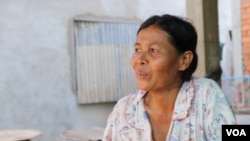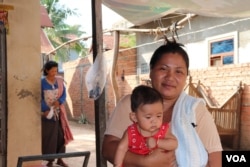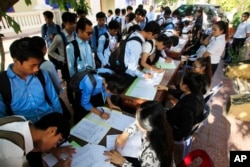When the census enumerator came to her home in the Chbar Ampov district in March, Kann Sarin was ready.
While only 30km from the capital city of Phnom Penh, the mother of four desperately wants a hospital built near her village.
The service would be a godsend, she told VOA, eliminating frequent trips to the city when family members fell sick.
However, the topic didn’t come up.
“They did not ask me if a hospital was accessible, or if there was anyone who gets sick and whether they have transportation to send patients to a hospital,” Kann Sarin told VOA Khmer.
“They didn’t ask about this. And the hospital is very far. There is no hospital in this village.”
Hers is not an isolated case. Several interviews with villagers and local authorities in recent weeks suggest that not all the questions on the six-page census questionnaire were asked during the process earlier this year.
The omissions, acknowledged by a village chief, could compromise the accuracy and comprehensiveness of the latest census, intended to provide a focused picture of Cambodia’s population and their situation. Results will be released Aug. 7.
The census enumerator took less than 15 minutes to ask questions in a census list with more than 20 questions, according to villagers. The questions were both simple, requiring only a yes or no answer, and complex, where answers required enumerators to evaluate answers.
Kann Sarin wanted to know more about the census, and how the results would be used “I didn’t have a chance to ask them.”
The enumerator spent less than 20 minutes asking questions about her family at her house, she said, “They looked like they were in a hurry, taking notes and rushing the work.”
Srey Kunthea, a garment worker for more than 20 years, was also ready to answer questions, see the census as a chance to raise concerns about issues pertinent to her family and community.
Srey Kunthea, who lives about half a kilometer away from Kann Sarin, said that she was not asked many questions.
“From what I learned from [news] on television, I think the census is good. They [government] want to know if people were better off,” Srey Kunthea said.
In early March, the head of the planning ministry, Chhay Thorn, appealed to citizens to participate in the census.
“[The] census will help us get an accurate number of the country’s population and will help the government make the right policies and help [us] exercise other policies to balance the development for all the people in the country,” he said.
The government spent more than $10 million this year on the census in order to get the “accurate demographic number” to help determine policies officials believe will improve the well-being of Cambodia’s 15 million citizens, he said.
But while some people who participated in the census said that they were not asked questions they thought would be important to improving their basic needs, others have scant understanding of what a census is, and why it is useful.
Kann Sarin is one of them, but she suspected the process is one the government uses to fulfill the needs of people like her and develop poor areas.
“I was not told what they are going to do with the census. They only ask some questions like how many members are there in my family, and did not tell me the use of the information,” Kann Sarin said.
A census is imperative for the country’s development as it “provides the statistical spine for reasoned debate, political planning, and policy decision making but skipping questions could lead to an imbalance in development,” said Michael Renfrew, a research fellow at Future Forum, a think tank in the capital, and Ph.D. candidate at the University of Glasgow.
Renfrew added that people engage more with enumerators and the census process, and provide more accurate information when they understand what the census is and why it is undertaken.
“Without this knowledge, citizens cannot adequately engage with the findings,” he said.
“For example, a census may identify a province with a larger proportion of aging citizens and another with a larger proportion of young citizens,” he said. “This would theoretically justify additional funding for elderly care systems in the province [one], and investment in employability opportunities and training in the provinces [two].”
Phon Kosal, 57, an enumerator in Bakheng commune, Chroy Changvar District, Phnom Penh said there were challenges. He added that the villagers’ minimal understanding of the census made their jobs even harder.
“We took up to 20 minutes with those families that were hard to collect information from because they don’t understand the questions,” Phon Kosal said.
“For instance, the [villagers] couldn’t even recall the year they were married, so we have to sit with them to calculate,” said Prum Sarith, 49, another enumerator in the same commune.
“We were short [of enumerators],” Sarith said. “It would have been better if we had two people in one area. If we had problems, we could have discussed them,” he added.
Sometimes Phon Kosal and Prum Sarith had to drop their own work to help others. Once the other enumerators finished, they took turns helping them finish the task.
The government allocated 50,000 enumerators to conduct the census throughout the country, in more than 14,000 villages. Each enumerator was paid six dollars per day.
A village chief in Chbar Ampov, Yann Heng, who was an enumerator, said the lack of enumerators meant many skipped some questions to speed up the process. He admitted he skipped some.
“It was troublesome,” said Yann Heng, 59. “We had to go to some household two to three times, without result. Sometimes only the elderly stayed home without any document because the children keep the documents.”
Yann Heng said that he ended up working with his deputy village chief counting the whole village.
“Enumerators just stopped coming,” he said. “We took another week.”
Hang Lina, director-general of the National Institute of Statistics, said that skipping questions would not impact the results of the census.
She added that the ministry had conducted a separate survey to sample the size of the population.
“This is to evaluate those skipped questions and those populations that were not being thoroughly counted,” she said
Lack of financial and technical support from international donors, who had involved in the previous process put the enumerators in a hard position, she added.
“We lobbied them several times, but they kept silent,” she said citing international organizations such as United Nations Population Fund (UNFPA), Swedish International Development Cooperation Agency (SIDA), Japan International Cooperation Agency (JICA). “I had no idea why,” she said. “But, these [institutions] want the data as well.”
Based on unreleased, preliminary numbers, Interior Ministry Sar Kheng hinted the final census results will reveal that Cambodia’s total population is about 15.2 million.
“From my personal perception, 15.2 million [population] is a small number for our country. At the least, we should have double that 15.2 million, which is about 30 million,” he said.
In 1998 the census showed the population was about 11 million, and the next census, in 2008 recorded 13 million people.
Kann Sarin, too, wants to know the result of the census. “I want to know, too,” she said, “but they didn’t let us know.”









